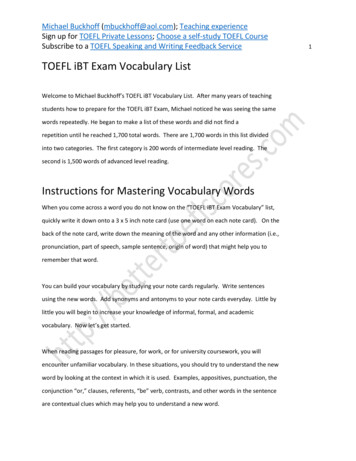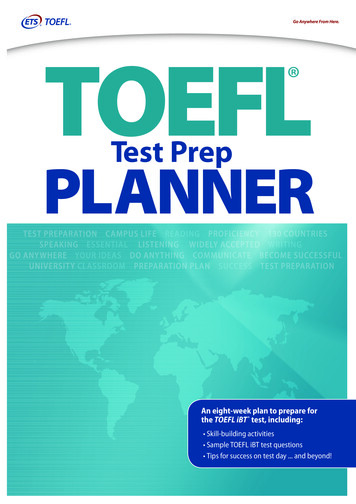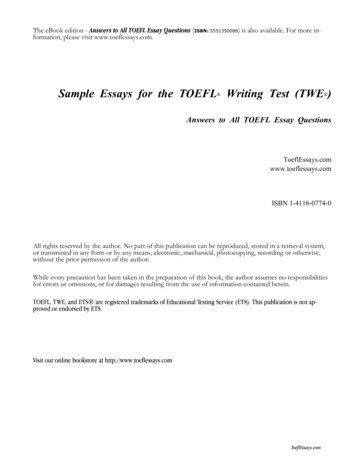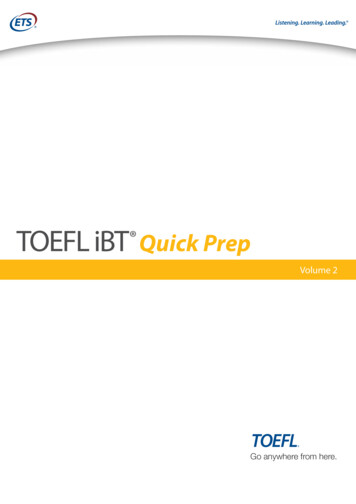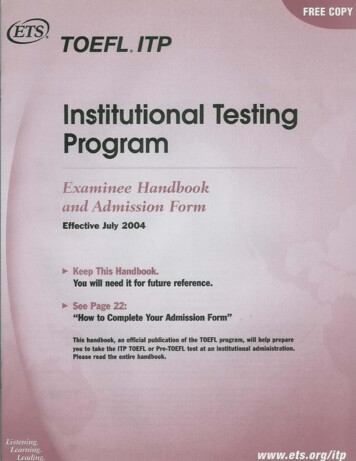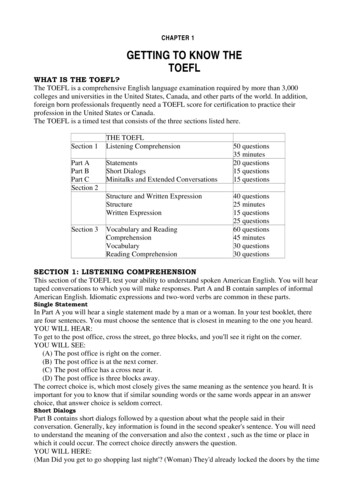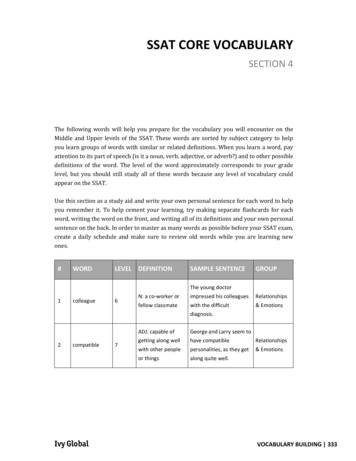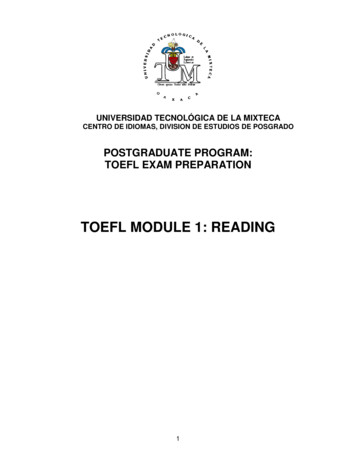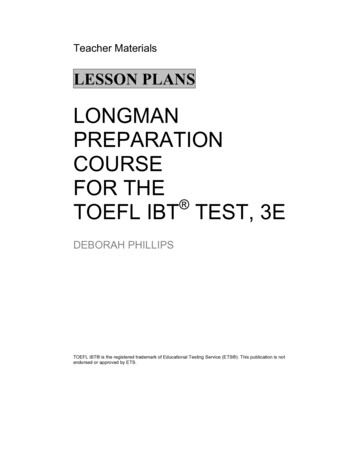
Transcription
TOEFL iBT ExamVocabulary List1700 Words
TOEFL iBT Exam Vocabulary ListWelcome to Michael Buckhoff’s TOEFL iBT Vocabulary List. After many years of teachingstudents how to prepare for the TOEFL iBT Exam, Michael noticed he was seeing the samewords over and over again. He began to make a list of these words and did not find arepetition until he reached 1,700 total words. There are 1,700 words in this list dividedinto two categories. The first category is 200 words of intermediate level reading. Thesecond is 1,500 words of advanced level reading.Instructions for Mastering Vocabulary WordsWhen you come across a word you do not know on the “TOEFL iBT Exam Vocabulary” list,quickly write it down onto a 3 x 5 inch note card (use one word on each note card). On theback of the note card, write down the meaning of the word and any other information (i.e.,pronunciation, part of speech, sample sentence, origin of word) that might help you toremember that word.You can build your vocabulary by studying your note cards regularly. Write sentencesusing the new words. Add synonyms and antonyms to your note cards everyday. Little bylittle you will begin to increase your knowledge of informal, formal, and academicvocabulary. Now let’s get started.When reading passages for pleasure, for work, or for university coursework, you willencounter unfamiliar vocabulary. In these situations, you should try to understand the newword by looking at the context in which it is used. Examples, appositives, punctuation, theconjunction “or,” clauses, referents, “be” verb, contrasts, and other words in the sentenceare contextual clues which may help you to understand a new word.
EXAMPLEExamples in the form of a word or phrase may help to explain the meaning of a word: as,case in point, for instance, for example, in fact, like, specifically, such as, and to illustrate.This outcome is a reflection of strong sense of solidarity within the corporatepeasant community; for instance, this solidarity is apparent in the tendency foralmost every man to remain within his village over his lifetime.The meaning of solidarity is identified by the example that most men remain within theirvillage during their lifetime; therefore, you can guess that solidarity means having anidentity or coincidence of interests, purposes, or sympathies among members of a certaingroup.APPOSITIVESIn some cases, an appositive [a noun or noun phrase which is set off by commas and whichmodifies another noun] can help you to identify the meaning of an unknown word.Whether psychology should be classified as a biological or social science was acontentious issue among scholars until 1960, after which time it was increasinglydescribed as a behavioral science; the science of the behavior oforganisms.The meaning of “behavioral science” is identified by its appositive, “the science of thebehavioral science.”PUNCTUATIONPunctuation marks can be used to set off a word which is used to identify another word.Some useful punctuation marks that might help you to understand the meaning of anunknown word are the following:brackets [ ]
commas ,dashes –double quotation marks “ ”parentheses ( )single quotation marks ‘ ’If the wire is bent into a coil, called a solenoid, the magnetic fields of theindividual loops combine to produce a strong field through the core of the coil.The meaning of “solenoid” which is set off by commas is identified by the definition whichprecedes it: “wire is bent into a coil.”THE CONJUNCTION “OR”Sometimes “or” and a synonym immediately comes after an unknown word or phrase.Haliaeetus leucocephalus, or the Bald Eagle, is one of two eagles in NorthAmerica and the only exclusively North American eagle.The meaning of the words “Haliaeetus leucocephalus” are identified by the words “the BaldEagle” following the word “or.”CLAUSESAdjective clauses and their connectors (i.e., that, when, where, which, who, and whom)may be used to identify words.Both the electric generator, which makes electricity widely available,and the electric motor, which converts electricity to useful mechanicalwork, are based on these effects.
The meaning of “electric generator” is identified by the adjective clause: “which makeselectricity widely available.” Similarly, the meaning of electric motor is identified by itsadjective clause: “which converts electricity to useful mechanical work.”REFERENTSReferents are words to refer to other words in a sentence or paragraph. The referent mayrefer to a previous word or one which follows it.It is one of the more remarkable feats of American literature, how a young man whonever graduated from high school, never received a college degree, living in a smalltown in the poorest state in the nation, all the while balancing a growing family ofdependents and impending financial ruin, could during the Great Depression writea series of novels all set in the same small Southern county — As I Lay Dying,Light in August, and above all, Absalom, Absalom! — that would one day berecognized as among the greatest novels ever written by an American.“As I Lay Dying, Light in August” and “Absalom, Absalom” can be identified by theirreferent “ a series of novels.”“BE” VERBThe object, which is referred to as the subject complement and which comes afterthe verb “be,” may be used to identify the subject.The Great Horned Owl Bubo virginianus is one of Canada's commonestlarge birds of prey.The meaning of “The Great Horned Owl Bubo virginianus” is identified by “large birds ofprey,” which comes after “is.”
CONTRASTSSometimes, the meaning of vocabulary words can be understood because they are incontrast to another word in the sentence. Some words to show contrast are the following:althoughbutdespiteeven thoughhoweverin contrastin spite ofinsteadneverthelesson the other handon the contraryorstillunlikeyetTsunamis are unlike wind-generated waves, which many of us may haveobserved on a local lake or at a coastal beach, in that they are characterized asshallow-water waves, with long periods and wave lengths.Tsunamis are understood to be “shallow-water waves” because they in contrast to “windgenerated waves.”OTHER WORDS IN THE SENTENCEOther words in a sentence may also help you to understand the meaning of vocabularywords.Sponges are the simplest grade of multi-celled animals. In general, spongeshave open-topped, sack-like bodies which are fixed to the sea floor. Wateris pulled through the body, and food is filtered out.
By using other words in the sentences as contextual clues, you can guess that a“sponge” is a “multi-celled animal” which is “fixed to the sea floor.”READING STRATEGYWhen encountering an unfamiliar vocabulary word, try the following:1.Read the sentence preceding the unfamiliar vocabulary word, read the sentence,inside of which the unfamiliar word in being used, and read the sentence followingthe unfamiliar word.2.Look for context clues to help you understand the meaning of the word.3.Look for examples, appositives, punctuation, the conjunction “or,” clauses,referents, “be” verb, and contrast statements as clues to help you understand theunfamiliar word.
200 Words of Intermediate TOEFL iBT VocabularyLesson FormatWord, Part of Speech, Word FormsSynonymsWord DefinitionSample SentenceAdorn, verb (adorns, adorning, adorned)embellish, garnish, ornament, trimFor example, if someone adorns a place, he puts decorations on it.His watercolor designs adorn a wide range of books.Magnificent, adjective (magnificently, magnificence)extraordinary, glorious, grand, splendid, superb, wonderfulFor example, if you say that something or someone is magnificent, you mean that youthink it is extremely good.It is a magnificent country house in wooded grounds.Impressive, adjective (impressively, impress, impression)awe-inspiring, grand, moving, thrilling; something that is impressive impresses you.For example, it is great in size or in degree or is done with a great deal of skill.It is an impressive achievement.Impress, verb (impresses, impressed, impressing)affect, influence, persuade, swayFor example, if something impresses you, you feel great admiration for it.What impressed him most was their speed.Deal, noun (dealer, dealings, dealt, dealing)agreement, arrangement, bargain, contract, understandingFor example, if you say that you need or have a great deal of or a good deal of a particularthing, you are emphasizing that you need or have a lot of it.I’m in a position to save you a good deal of time.
Throughout, prepositionFor example, if you say that something happens throughout a particular time, you meanthat it happens during the whole of that period.The national tragedy of rival groups killing each other continued throughout 1990.Tragedy, noun (tragic, tragically)calamity, catastrophe, disaster, misadventureFor example, a tragedy is an extremely sad event or situation.They have suffered an enormous personal tragedy.Involve, verb (involved, involves, involving, involvement)comprise, consist of, contain, entail, includeFor example, if a situation or activity involves something, that thing is a necessary part orconsequence of it.Running a kitchen involves a great deal of discipline and speed.Run, verb (runs, ran, running)function, operate, administer, control, govern, and manageFor example, if you run something such as a business or an activity, you are in charge of itor you organize it.His stepfather ran a prosperous paint business.Discipline, noun (disciplines, disciplining, disciplined)chastisement, correction, punishment, control, moderation, restraintOrder and discipline have been placed in the hands of headmasters and governingbodies.Consequence, noun (consequences, consequently)aftermath, effect, price, repercussion, resultFor example, the consequences of something are the results or effects of it.Her lawyer said she understood the consequence of her actions and was prepared to goto jail.Step-father, nounSomeone’s step-father is the man who has married a child’s mother after the death ordivorce of his father.Her step-father has been married to her mother for five years.
Enormous, adj (enormously)big, giant, huge, immense, jumbo, tremendousFor example, something that is enormous is extremely large in size or amount.The main bedroom is enormous.Rival, noun, verb (rivals, rivaling, rivaled)challenger, competitor, contender, adversary, enemyFor example, your rival is a person, business, or organization against whom you arecompeting or fighting in the same area or for the same things.He eliminated his rival in brutal struggle for power.Compete, verb (competes, competing, competed, competition, competitive,competitively)contend, contest, rival, vie, combat, fight, strive, oppose;For example, when one firm or country competes with another, it tries to get people to buyits own goods in preference to those of the other firms or countries. You can also say thattwo firms or countries compete.The banks have long competed with American Express’s charge cards and various storecards.For example, if you compete with someone for something, you try to get it for yourself andstop the other person from getting it. You can also say that two people compete forsomething.Kangaroos compete with sheep and cattle for sparse supplies of food and water.Preference, noun (preferences prefer, preferred, preferably)choice, desire, favorite, option, selectionFor example, if you have a preference for something, you would like to have or do thatthing rather than something else.Many or these products were bought because customers had a preference for them.In preference to, noun phraseIf you choose one thing in preference to another, you choose it instead because it is better.Many people choose the train in preference to driving.
Engrave, verb (engraves, engraving, engraved)For example, if you engrave something with a design of words, or if you engrave a designor words on it, you cut the design or words onto its surface.Your wedding ring can be engraved with a personal inscription at no extra cost.Inscription, noun (inscriptions, inscribe)carving, engraving, epitaph, etchingFor example, an inscription is writing carved into something made of stone or metal, forexample a gravestone or metal.Above its doors was a Latin inscriptionBrutal, adj (brutalize, brutality, brutally)vicious, savage, cruel, fierce, harsh, inhuman, ruthless, unmerciful, unforgivingFor example, a brutal act or person is cruel and violent.He was the victim of a very brutal murder.Struggle, verb (struggles, struggling, struggled)attempt, endeavor, offer, seek, strive, undertakeFor example, if you struggle to do something, you try hard to do it, even though otherpeople or things may be making it difficult for you to succeed.They had to struggle against all kinds of adversity.For example, if two people struggle with each other, they fight.She screamed at him to ‘stop it’ as they struggled on the ground.(noun) He died in a struggle with prison officers less than two months after comingBritain.Adversity, noun (adversities, adversary, adversely)misfortune, mischance, mishap, tragedyFor example, adversity is a very difficult or unfavorable situation.He showed courage in adversity.Awkward, adjective (awkwardness, awkwardly)bumbling, clumsy, halting, heavy-handed, inept, lumbering, uncomfortableFor example, a situation in which you feel so embarrassed that you are not sure what to door say.The more she tried to get out of the situation, the more awkward it became.
Make things awkward, verb phraseFor example, to cause trouble and make a situation very difficultShe could make things very awkward if she wanted to.Prison, noun (prisons, imprison, imprisoned)can, cooler, lockup, pen, penitentiary, reformatory, stockadeFor example, a prison is a building where criminals are kept as punishment or wherepeople accused of crime are kept before their trial.After being convicted of bank robbery, she was sent to prison.Favorable, adjective (favors, favorably, favorite)agreeable, good, grateful, gratifying, nice, pleasing, pleasurable, welcomeFor example, if your opinion or your reaction is favorable to something, you agree with itand approve of it. If something makes a favorable impression on you or is a favorable toyou, you like it and approve of it.His ability to talk while eating fast made a favorable impression on his diningcompanions.Accuse, verb (accuses, accusing, accused, accusation)arraign, charge, criminalize, impeach, incriminate, inculpate, indictFor example, if you accuse someone of doing something wrong or dishonest, you say or tellthem that you believe that they did.My mom was really upset because he was accusing her of having an affair with anotherman.Approve, verb (approves, approving, approved, approval)accept favor, go for, accredit, certify, endorse, OK (or okay), sanctionFor example, if you approve of an action, event, or suggestion, you like it or are pleased.Not everyone approved of the festival.Upset, adj (upsets, upsetting, and upset)agitate, bother, discombobulate, disquiet, disturb, flurry, fluster, perturb, unhingeFor example, if you are upset, you are unhappy or disappointed because somethingunpleasant has happened to you.After she died, I felt very, very upset.For example, if something upsets you, it makes you feel worried or unhappy.The whole incident had upset me and my fiancée terribly.
Incident, noun (incidents, incidentally)occurrence, circumstance, episode, event, happening, occasion, thingsFor example, an incident is something that happens, especially something that is unusual.These incidents were the latest in a series of disputes between two nations.Dispute, noun (disputes, disputing, disputed)argue, bicker, hassle, quibble, squabble, wrangleFor example, a dispute is an argument or disagreement between people or groups.They have won previous pay disputes with the government.(verb) If you dispute a fact, statement, or theory, you say that it is incorrect or untrue.He disputed the allegations.Allegation, noun (allegations allege, alleged, allegedly)For example, an allegation is a statement saying that someone has done something wrong.The company denied the allegation.Affair, noun (affairs)business, concern, matter, shooting match, thingFor example, if an event or series of events has been mentioned and you want to talk aboutit again, you can refer to it as the affair.The government has mishandled the whole affair.Mishandle, verb (mishandles, mishandling, mishandled)abuse, misapply, disapprove, misuse, pervert, prostituteFor example, if you say that someone has mishandled something, you are critical of thembecause you think the have dealt with it badly.She completely mishandled an important project purely through lack of attention.Critical, adjective (criticism, criticize, critique)acute, climacteric, crucial, desperate, direFor example, a critical time, factor, or situation is extremely important.The incident happened at a critical point in the campaign.For example, a critical situation is very serious and dangerous.The German authorities are considering an airlift if the situation becomes critical. He isin critical condition after the auto accident.For example, to be critical of someone or something means to criticize them.
His report is highly critical of the trial judge.Campaign, noun (campaign, campaigning, campaigned)For example, a campaign is a planned set of activities that people carry out over a period oftime in order to achieve something such as social or political change.During his election campaign he promised to put the economy back on its feet.(verb) If someone campaigns for something, they carry out a planned set of activities over aperiod of time in order to achieve their aim.We are campaigning to improve the legal status of woman.Carry out administer, administrate, execute, govern, renderFor example, if you carry out a threat, task, or instruction, you do it or act according to it.Police say that they believe the attacks were carried out by nationalists. Commitmentshave been made with little intention of carrying them out.Election, noun (elections, elect, electioneer, elective)choice, alternative, option, preference, selectionFor example, an election is a process in which people vote to choose a person or group ofpeople to hold an official position.The final election results will be announced on Friday.Legal, adjective (legalize, legality, legally)lawful, innocent, legitimate, licitFor example, legal is used to describe things that relate to the law.He vowed to take legal action. I sought legal advice on this.Threat, noun (threaten, threatened, threatening)danger, menace, liabilityFor example, a threat to a person or things is a danger that something unpleasant mighthappen to them. A threat is also the cause of this danger.Some couples see single women as a threat to their relationships.
Secure, verb (secures, securing, secured)cover, fend, guard, protect, safeguard, screen, shieldFor example, if you secure something that you want or need, you obtain it, often after a lotof effort. Secure is used in a formal context.Federal leaders continued their efforts to secure a ceasefire.Obtain, verb (obtains, obtaining, obtained)acquire, annex, chalk up, gain, have, pick up, procure, secure, winFor example, to obtain something means to get it or achieve it.The perfect body has always been difficult to obtain.Cease-fire, noun (cease-fires)truce, armisticeFor example, a cease-fire is an agreement in which countries or groups of people that arefighting each other agree to stop fighting.They have agreed to a cease-fire after three years of conflict.Investigate, noun (investigates, investigating, investigated, investigation)explore, delve (into), dig (into), go (into), inquire (into), look (into), probe, prospect, siftFor example, if someone, especially an official, investigates an event, situation, or claim, hetries to find out what happened or what the truth is.Police are still investigating how the accident happened.Dispatch, verb (dispatches, dispatching, dispatched)address, consign, forward, remit, route, ship, transmitFor example, if you dispatch someone to a place, you send him there for a particularreason.The Italian government was preparing to dispatch 4,000 soldiers to search theisland.Replacement, noun (replace, replaced)alternate, backup, fill-in, pinch hitter, stand-in, sub, surrogateFor example, if you refer to the replacement of one thing by another, you mean that secondthing takes the place of the first.
Let’s investigate the problem before we dispatch replacements.the replacement ofdamaged or lost books.Substitute, verb (substitutes, substituting, substituted)exchange, change, swap, switch, tradeFor example, if you substitute one thing for another, or if one thing substitutes for another,it takes the place or performs the function of the other thing.They were substituting violence for dialog.Vague, adjective (vaguer, vaguest)ambiguous, equivocal, opaque, uncertain, unclear, inexplicit, unintelligibleFor example, if something written or spoken is vague, it does not explain or express thingsclearly.A lot of talk was apparently vague and general.Apparently, adverb (apparent)ostensibly, evidently, officially, outwardly, professedly, seeminglyFor example, you use apparently to indicate that the information you are giving issomething that you have heard, but you are not certain that it is true.Apparently, the girls are not amused by the whole business.Amuse, verb (amuses, amusing, amused)divert, entertain, recreateFor example, if something amuses you, it makes you want to laugh and smile.The thought seemed to amuse him.Municipal, adjective (municipality)urban, cityFor example, municipal means associated with or belonging to a city or town.A new mayor will be elected in the upcoming municipal election.Upcoming, adjectiveapproaching, coming, nearing, oncoming, forthcomingFor example, upcoming events will happen in the near future.We’ll face a tough fight in the upcoming election.
Vintage, adjective (vintages)old fashioned, antiquated, antique, archaic, dated, old, outdated, outmodedFor example, you can use vintage to describe something which is the best and most typicalof its kind.Are you interested in vintage automobiles?Veritable, adjectiveauthentic, bona fide, genuine, indubitable, real, sure-enough, true, undoubtedFor example, you can use veritable to emphasize the size, amount, or nature of something.There was a veritable army of security guards.Anthropology, noun (anthropological)For example, anthropology is the scientific study of people, society, and culture.My major is Anthropology.Fascinate, verb (fascinates, fascinating, fascinated, fascination)grip, hold, mesmerize, spellbind, enthrallFor example, if something fascinates you, it interests and delights you so much that yourthoughts tend to concentrate on it.Politics fascinated Franklin’s father.Belongings, nouneffects, goods, movables, things, possessionsFor example, your belongings are the things that you own, especially things that are smallenough to be carried.I collected my belongings and left.Lease, noun (leases, leasing, leased)hire, charter, let, rentFor example, a lease is a legal agreement by which the owner of a building, a piece of land,or a car allows someone else to use it for a period of time in return for money.We’ve taken out a lease on an office building. (take out a lease sign a lease so thatyou can rent something)
Eviction, noun (evictions)kicks outFor example, eviction is the act or process of officially forcing someone to leave a house orpiece of land.He was facing eviction, along with his wife and family.Along with, prepositionFor example, you use along with to mention someone or something else that is alsoinvolved in an action or situation.He was facing eviction, along with his wife and family.Vacate, verb (vacates, vacating, vacated)abandon, give up, part (with or from), relinquish, leave, quitFor example, if you vacate a place or a job, you leave it or give it up, making it available foranother person.He vacated the apartment and went to stay with an uncle.Analyze, verb (analyzes, analyzing, analyzed)divide, part, separate, assort, classify, pigeonhole, examine, inspect, investigate, scrutinizeFor example, if you analyze something, you consider it carefully or use statistical methodsin order to fully understand it.This book teaches you how to analyze what is causing the stress in your life.Term (in terms of), prepositional phraseIf you explain or judge something in terms of a particular fact or event, you are onlyinterested in its connection with that fact or event.US foreign policy tended to see everything in terms of the Vietnam War.Challenging, adjectivearduous, effortful, labored, laborious, strenuous, toilsome, uphillFor example, a challenging task or job requires great effort and determination.Mike found a challenging job as a computer programmer.Unrestrained, adjectiveexcessive, immoderate, inordinate, intemperate, overindulgentFor example, if you describe someone’s behavior as unrestrained, you mean that it isextreme or intense because he/she is expressing his/her feelings strongly or loudly.
There was unrestrained joy on the faces of people.Intense, adjectiveconcentrated, desperate, exquisite, fierce, furious, terrible, vehement, vicious, and violentFor example, intense is used to describe something that is very great or extreme in strengthor degree.Suddenly, the room filled with intense light.Hypertension, nounFor example, hypertension is a medical condition in which a person has high bloodpressure.He suffered from hypertension and accompanying heart problems.Accompany, verb (accompanies, accompanying, accompanied, accompaniment)attend, bear, bring, carry, chaperon, companion, company, conduct, convoy, escortFor example, if one thing accompanies another, it happens or exists at the same time, or asa result of it. (Formal)The proposal was instantly voted through with two to one in favor, accompanied byenthusiastic applause.Proposal, noun (proposals)invitation, proffer, proposition, suggestionFor example, a proposal is a plan or an idea, often a formal or written one, which issuggested for people to think about and decide upon.A proposal outlining how the new voting district would be drawn up was submitted tothe City Council.In favor, prepositional phraseFor example, if someone or something is in favor, people like or support it. If they are outof favor, people no longer like or support them.She’s very much in favor with the management at the moment.Applause, noun (applaud, applauded)cheers, hand, ovation, round, cheering, clapping, rootingFor example, applause is the noise made by a group of people clapping their hands to showapproval.They greeted him with thunderous applause.
Constitution, noun (constitutions)The constitution of a country or organization is the system of laws which formally statesthe people’s rights and duties.The Constitution of the United States was written in 1776.Cope, verb (copes, coping, coped)deal with, overcomeFor example, if you cope with a problem or a task, you deal with it successfully.It was amazing how my mother coped with bringing up three children on less than threehundred dollars a week.Deal with, verb phrasetreat, handle, play, serve, take, useFor example, when you deal with something or someone that needs attention, you giveyour attention to it, and often solve a problem or make a decision concerning it.The president said the agreement would allow other vital problems to be dealt with.Vital, adjective (vitally, vitality, vitalize, vitalized)essential, cardinal, constitutive, fundamentalFor example, if you say that something is vital, you mean that it is necessary or important.The port is vital to supply relief to millions of droughts victims.Pupil, noun (pupils)studentsFor example, the pupils of a school are the children who go to it.I teach private pupils on Wednesday.Standardize, verb (standard, standardizes, standardizing, standardized)For example, to standardize things means to change them so that they all are the same.He feels standardized education does not benefit those children who are either below orabove overage.
Concrete, adjectiveFor example, you use concrete to indicate that something is definite and specific.There were no concrete proposals on the table.Incentive, noun (incentives)stimulus, catalyst, goad, impetus, impulse, incitation, incitement, motivation, stimulantFor example, if something is an incentive to do something, it encourages you to do it.There is little or no incentive to adopt such measures.Definite, adjective (definitely, definiteness, definitive)circumscribed, determinate, fixed, limited, narrow, precise, restrictedDefinite evidence or information is true, rather than being someone’s opinion or guesses.We didn’t have any definite proof.Assumption, noun (assume, assumed, assumptions)presumption, presuppositionIf you make an assumption that something is true, or will happen, you accept that it is trueor will happen, often without any real proof.Dr. Subroto questioned the scientific assumption on which the global warming theory isbased.Mediate, verb (mediates, mediating, mediated, mediator)interpose, intercede, interfere, intermediate, intervene, step inFor example, if someone mediates between two groups of people, he tries to settle anagreement by talking to both groups to find out which things they can both agree.United Nations officials have mediated a serious of peace meetings between the two sides.Settle, verb (settles, settling, settled, settlement)calm, allay, becalm, compose, lull, quiet, quieted, soothe, still, tranquilizeIf people settle an argument or problem, or if someone settles it, they solve it, for exampleby making a decision about who is right or about what to do.They agreed to try to settle their dispute by negotiation.Dispute, noun (disputes)argue, bicker, hassle, quibble, squabb
TOEFL iBT Exam Vocabulary List Welcome to Michael Buckhoff’s TOEFL iBT Vocabulary List. After many years of teaching students how to prepare for the TOEFL iBT Exam, Michael noticed he was seeing the same words over and over again. He began to make a list of these words and did
